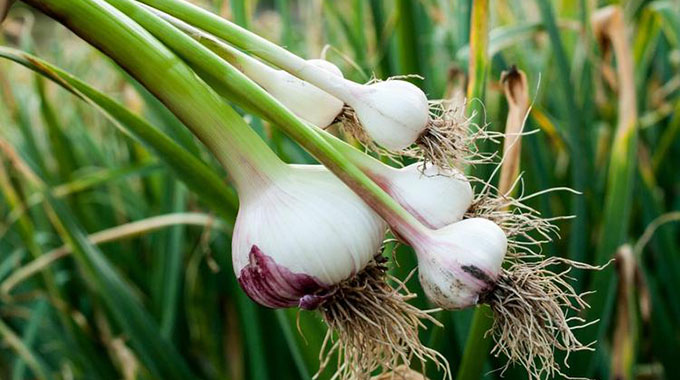
Ishemunyoro Chingwere
Business Reporter
The country’s export promotion and development agency, ZimTrade, has secured funding for a capacity building program on the cultivation and certification of organic garlic whose demand has been soaring on the international market, the agency’s chief executive Mr Allan Majuru has said.
Mr Majuru revealed this last week when he spoke to garlic farmers who converged at Guzha Primary School in Gutu District during the official launch of Gutu Central Constituency Garlic Export Program spearheaded and financed by Member of Parliament Winston Chitando.
The project is informed by Zimbabwe’s economic development blueprint, National Development Strategy 1 (NDS1), which seeks to widen the country’s export basket and grow export earnings as the economy gears towards upper middle-income status as espoused by President Mnangagwa.
Demand for garlic has been on the rise during two decades with the market growing from about US$500 million to US$2,4 billion in 2020. Zimbabwe is now positioning itself for a seat on this growing market.
President Mnangagwa encouraged the farmers to take garlic production seriously as it has the potential to foster rapid rural industrialisation as well as boosting their income through export oriented crops.
The President’s remarks were delivered in a speech read on his behalf by the ruling Zanu PF party’s Secretary for Administration Dr Obert Mpofu.
The booming market however, has a clear bias towards organic garlic and ZimTrade is working with the Traditional Grains Producers Association (TGPA) to tap into the organisation’s expertise.
“Mr (Basil) Nyabadza (TGPA) chairman talked about the production of organic garlic, from which I am pleased to tell you that there are some development partners who have availed funding for us to undertake capacity building in organic garlic production,” ZimTrade CEO Mr Allan Majuru told farmers.
“For you to export organic garlic they need certification, so we will bring those international partners so that they train our farmers in the same manner we did with organic pineapple farmers in Chimanimani and they are already exporting to Netherlands.
“We must, on a regular basis, find new crops which have a scope for exports that we then promote and encourage their cultivation in a bid to grow the farmers’ return and the country’s exports,” he said.
In line with Government’s thrust on value addition and beneficiation, Mr Majuru said there is a huge scope for value addition and the export agency was already working with a local company which has started garlic value addition and is exporting garlic oil to Botswana.
In addition to targeting rural farmers with the export crop, the Gutu project is also targeting 37 schools in the constituency who are earmarked for the cultivation of at least half a hectare of garlic and ginger which has the potential to generate US$40 000 for the schools annually.
The crops will be alternated with garlic running March to October and ginger November to February.
Minister Chitando said bringing schools on board was meant to make schools business centres and thus help them achieve self-sustenance.
In an interview with this publication, Garlic, Ginger and Turmeric Growers Association of Zimbabwe field advisor Mr Douglas Msipa – himself an established commercial garlic farmer said farmer uptake on the new crops was very encouraging.
“The uptake is very good,” said Mr Msipa, “Very encouraging if I may say and I think within the next five or so years Zimbabwe could be a force to reckon with in garlic, ginger and turmeric production in the world.
“You had Minister Chitando giving a breakdown of the figures just now. With just half a hectare which can easily be irrigated manually, one can alternate garlic and ginger in one year and get about US$20 000 from each as net profit which will make the farmer US$40 000 well off, in a year’s production,” he said.
